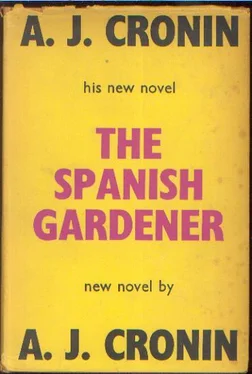Archibald Cronin - The Spanish gardener
Здесь есть возможность читать онлайн «Archibald Cronin - The Spanish gardener» весь текст электронной книги совершенно бесплатно (целиком полную версию без сокращений). В некоторых случаях можно слушать аудио, скачать через торрент в формате fb2 и присутствует краткое содержание. Жанр: Классическая проза, на английском языке. Описание произведения, (предисловие) а так же отзывы посетителей доступны на портале библиотеки ЛибКат.
- Название:The Spanish gardener
- Автор:
- Жанр:
- Год:неизвестен
- ISBN:нет данных
- Рейтинг книги:4 / 5. Голосов: 1
-
Избранное:Добавить в избранное
- Отзывы:
-
Ваша оценка:
- 80
- 1
- 2
- 3
- 4
- 5
The Spanish gardener: краткое содержание, описание и аннотация
Предлагаем к чтению аннотацию, описание, краткое содержание или предисловие (зависит от того, что написал сам автор книги «The Spanish gardener»). Если вы не нашли необходимую информацию о книге — напишите в комментариях, мы постараемся отыскать её.
The Spanish gardener — читать онлайн бесплатно полную книгу (весь текст) целиком
Ниже представлен текст книги, разбитый по страницам. Система сохранения места последней прочитанной страницы, позволяет с удобством читать онлайн бесплатно книгу «The Spanish gardener», без необходимости каждый раз заново искать на чём Вы остановились. Поставьте закладку, и сможете в любой момент перейти на страницу, на которой закончили чтение.
Интервал:
Закладка:
"Really, it was a victory for us"—Nicholas chattered as they got into the car—"for José belongs to our establishment. And it was he who won the game."
Without answer, Harrington Brande stabbed the self-starter. And as he drove off, gazing straight ahead, the little boy began, doubtfully, to steal glances at him, wondering if he had, inadvertently, given offence.
"Is anything wrong, Father?" he asked, at last.
There was a perceptible pause.
"No, Nicholas, nothing is wrong, except that I have a splitting headache. You see, I am not used to being crushed in with the common herd, or to being pushed, elbowed and kicked for the sake of a stupid game."
"But Father …" Nicholas, confounded, was about to make some protest but the sight of that chilly profile caused him to break off.
Dinner was ready when they reached home. But the silence continued through the meal, one of those aloof and frozen silences which the Consul periodically imposed, when he seemed to retreat far within himself and to gaze through persons and objects as though viewing, like an outraged god, only those things which were empyrean and eternal.
"Shall I go upstairs now, Father?" Nicholas asked, in a subdued voice, when he had drained the last of his milk.
"As you please."
Slowly and sadly, the little boy mounted the wide, dark walnut stairway. The joy of the day, with its excitement and novelty, its overtones and lustre, was quenched within him. He forgot about José and the game, could think only of his father's stern, afflicted face. Accustomed to the joint ritual of the evening he felt himself disowned and deserted in the great shadowy bedroom. He undressed listlessly, washed, and pulled on his nightshirt. Then, turning, he saw the Consul in the doorway.
"Oh, Father." He gulped with relief. “I thought you wouldn't come."
The Consul answered gravely:
“I am not likely to fail in my duty, Nicholas."
"I'm sorry if I've done anything, really I am, Father." It was hard for him to keep back his tears. "But I … I don't know what it is."
"Kneel for your prayers." The Consul took his usual place, laid an arm upon the boy's shoulders, his tone turning low. "You are growing up now, Nicholas. You must be aware how painful and difficult are the circumstances of my life. You know the burden I have borne since … since your mother left us. Lately my insomnia, increased by my literary labours, has become a perfect martyrdom. There are days when I am so overcome by suffering and exhaustion I can barely concentrate upon my work. And yet …" the Consul lifted a knitted brow … "in spite of all this, I have devoted, consecrated myself unswervingly, to you."
The little boy hung his head. Tears, like crystal dew-drops, were forming upon his soft lashes.
"Yes, Nicholas, I have been not only your father, but your friend, your teacher, your nurse. I do not deny that I have drawn from this dedicated service a deep felicity… a gladness and refreshment which brought balm to my wounded soul. It is, my dear child, a labour of love. Yet even the most unselfish passion demands some slight affection in return. That is why, today, my heart has been rent by the thought that … you do not care for me."
"No, no, Father!" Nicholas cried out, finding words at last. "It's not true. How can you believe such a thing?"
A strange flicker passed across the crucified face.
"Some things are intangible, my child. A careless word … a look … a chance gesture …"
"No, no." Nicholas almost shouted. "I do love you, you know I do. Mother treated you abominably. But I won't. We'll always be together." Weeping hysterically, his body shaking, Nicholas reached up and threw his arms around his father's neck.
"My own boy." The Consul murmured, holding closely against him that slight living burden. As he felt, upon his breast, the birdlike flutter of the childish heart, an invading warmth melted the pain within him. He sighed and closed his eyes.
At last he gently disengaged himself, spoke with a tender smile.
"Now say your prayers, dear child, and I will read to you."
Chapter 5
YET through the sweetness of this reconciliation, the fond knowledge that Nicholas was more completely attached to him than ever, the Consul could not forget the part played by José in that painful, if brief, estrangement. It had been his practice as he left the villa in the morning to acknowledge, distantly, his gardener's respectful salute. Now, however, he passed by with studied indifference, his face averted, eyes fixed straight ahead, as though to avoid seeing him. Yet in that brief moment, he was acutely conscious of the youth, of his young figure under the light cotton, the vigorous sweep of his arms as he swung the long scythe, his warmly ingenuous smile. And a surge of resentment went through his veins, an irritation that remained with him long after he had reached the office.
He tried to shake off this emotion. It was preposterous that he should permit himself to be disturbed by a mere servant, a common youngster from the town, and quite beneath his dignity to take any action in a matter which, after all, seemed less important when viewed in retrospect. Doubtless the fellow had bragged to Nicholas about his prowess at pelota and had urged him to come to watch him play the game. No more than that. Nevertheless, despite this reasoning, there remained in the Consul's breast that strange sense of jealousy, and an animosity which, as though it fed upon itself, seemed to grow from day to day.
For a while José noticed nothing, but as one morning succeeded another and still his master passed him with that impervious frown, he began to fear that he was failing to give satisfaction and his simple heart was filled with apprehension. Work was scarce in San Jorge, good situations difficult to find, and he had his mother, Maria, to think of, to say nothing of his sisters, and old Pedro, his grandfather, who had not done a stroke for seven years. Alarmed, he increased his already strenuous efforts, arrived half an hour earlier than the stipulated time, departed only when dusk began to fall.
One morning, as he worked into an uncleared patch beyond the rocky wall, he saw, deep in the mossy shelter of some myrtle shrubs, three fragile white stars, still damp with dew—the first freesias. His eyes lit up with pleasure, he stood in admiration for a long moment, then nodded to himself, crushed into the undergrowth, and carefully picked the flowers. In the tool shed, whistling under his breath, he bound them neatly with raffia against a light spray of fern. Smartening his hair before the broken scrap of mirror, he hastened to the front porch. He had not long to wait before his master appeared on the verandah.
"Señor," José said, and stopped, finding it too difficult to make the agreeable speech which he had prepared. He simply smiled, with touching diffidence, and handed up the boutonnière.
There was a pause. The Consul, like one forced against his will, slowly turned, and for the first time, since the pelota game, looked directly at the youth. This action, which seemed to break down some deep-seated and primitive inhibition, produced in him a curious sense of liberation, of mastery. His sense of tension, so long suppressed, was suddenly dissolved and instead, he felt himself capable of an almost super-human calm.
"What is this?" he inquired formally.
"For your pleasure, señor… to wear. The first freesias of spring."
"You picked them … these flowers?"
"But … yes, señor."
"You have no right to do such a thing. These flowers are mine. I do not wish them picked. I wish them to remain growing in the garden, where they properly belong."
"But, señor…" José faltered.
"That is enough. You are a stupid, self-willed fellow. You exceed your position. Let us have no more of it in future. Do you understand?"
Читать дальшеИнтервал:
Закладка:
Похожие книги на «The Spanish gardener»
Представляем Вашему вниманию похожие книги на «The Spanish gardener» списком для выбора. Мы отобрали схожую по названию и смыслу литературу в надежде предоставить читателям больше вариантов отыскать новые, интересные, ещё непрочитанные произведения.
Обсуждение, отзывы о книге «The Spanish gardener» и просто собственные мнения читателей. Оставьте ваши комментарии, напишите, что Вы думаете о произведении, его смысле или главных героях. Укажите что конкретно понравилось, а что нет, и почему Вы так считаете.












